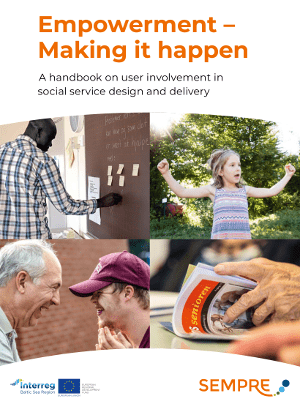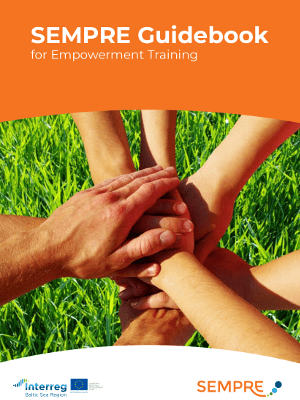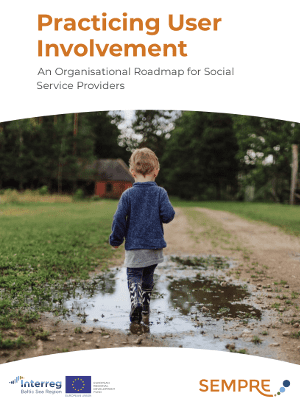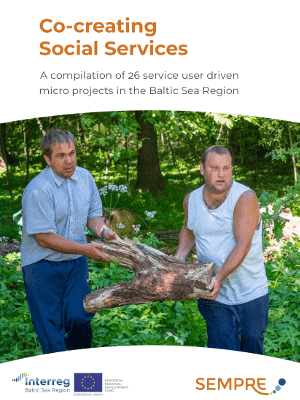SEMPRE
More people in need in the countryside
Many rural areas in the countries around the Baltic Sea have been losing inhabitants for years. Young and qualified people leave the villages because they find better job opportunities and living conditions in the cities. The ones who have less of a choice remain in the countryside: elderly people, people with disabilities, migrants, single parents. These people are at risk of poverty and durable social exclusion.
Welfare organisations need to learn how to help with less resources
Social service providers could take care of such vulnerable groups, but they, too, suffer from ever smaller budgets and work force. Social services by their nature aim to build stronger communities and to promote equality and opportunity. They are typically provided by welfare and public sector organisations, NGOs or social enterprises. In the changing settings in our rural areas, social service providers need to find new ways of supporting their clients – they need service innovation. And one new approach is empowerment.
Empowering disadvantaged people to help themselves
Empowerment means that social service providers involve those belonging to vulnerable groups into designing the services they need and ideally into providing those services to each other. Social service providers who use empowerment methods rather connect people who can help each other instead of providing help themselves. Social service providers in some countries (e.g. in northern Germany) had been experimenting with for a while. With SEMPRE they wanted to expand the method to partner organisations in various countries around the Baltic Sea.
Budgets
in numbers
-
4.86MillionTotal
-
3.83MillionErdf
-
0.00MillionEni + Russia
-
0.00MillionNorway
Achievements
The SEMPRE project brought together charity organisations with trainers for organisational development and with universities – altogether from eight countries - to test empowerment approaches in the local context and to learn from each other.
Local networks to bring empowerment to rural areas
The SEMPRE partners set up local empowerment networks of social service providers, public authorities, NGOs and local organisations to test different empowerment tools and methods together, such as the theory of change, future workshops or the social business model canvas. Altogether, there are 13 such networks: in Denmark (Varde and Tønder), Estonia (Võrumaa and Põlvamaa), Finland (Ostrobothnia, Kokkoloa, Pieterssari), Germany (Dithmarschen, Nordfriesland, County of Plön), Latvia (Liepaja and Vidzeme), Lithuania (Pagegiai and Jurbakas), and Sweden (Boden, Luleå and Övertorneå).
Micro projects to develop services
One of the tools tested in the local networks are so-called micro projects, i.e. small-scale initiatives at the local level that aim to improve the living situations of members of disadvantaged groups. Within the project lifetime some 35 creative and very diverse micro-projects were initiated and captured in a video and a brochure. And most of them continue in one way or the other. The local empowerment networks helped those who initiated micro project to learn, to explore, and to communicate with stakeholders and service providers, thus stretching their own network contacts and competences.
Five of the micro-projects have already been registered, some as cooperative ("AllDi" – a network of single Parents in Dithmarschen, Germany, and the “Tailor Cooperative” in Luleå, Sweden, which combines work integration of migrants with producing sustainable textiles); one as a social enterprise (the coffee shop "Stop over" in Liepa, Latvia), some as NGOs (the “Afghan Association” in Kokkola, Finland, that promotes social collaboration and "Roku Roka - Hand in Hand" in Latvia which trains assistants to people with disabilities).
Many services continue
Eight micro-projects resulted in new social services taken up by social service providers in their regular service portfolios. For example, in Lithuania, Jurbarkas District Municipality set up a regular family afternoon at which a business plan for the establishment of a multifunctional social service centre was thought up. In Estonia, inhabitants of the small village Harkujärve turned an empty church building into a vibrant community centre with the support of the local church and an NGO. The Municipality of Varde (Denmark) set up a parents’ nights for refugee parents at which the school gets a good insight in what parents with refugee background struggle with in relation to their children’s schooling. Thirteen other new services continue as informal initiatives or under the coordination of an established social service provider after the project.
From micro projects to established social start-ups
In the follow-up project SEMPRE ACCELERATORS, additional support mechanisms are going to be applied to accelerate the growth and development of the most promising micro projects developed within SEMPRE and turn them into self-sustaining social start-ups that offer services and/or products on local and regional markets of the Baltic Sea region. Overall, the Interreg project SEMPRE used EUR 3.83 million of support form the European Union wisely to let a smart idea, i.e. empowerment in social services, become common practice in numerous charity organisations in rural areas of the Baltic Sea region.
Outputs
Empowerment - a handbook on user involvmement in social service design and delivery

Guidebook for Empowerment Training

Organisational roadmap for social service providers: Practiving user involvement

Brochure: Co-creating Social Services. A compilation of 26 service user driven micro projects in the Baltic Sea Region

Project Stories
-
20.12.2016
New skills for social workers in Lithuania and beyond
Many rural areas in the Baltic Sea Region find themselves in a downward spiral, where outward migration and the recent economic downturn are leading to a deterioration of social service infrastructure and quality of life. Social empowerment in rural areas (SEMPRE) – a project funded by Interreg Baltic Sea Region - is getting ready to improve social services.Read full story
Partners
Diaconie of Schleswig-Holstein
- TownRendsburg
- RegionRendsburg-Eckernförde
- CountryGermany
- RepresentativeDoris Scheer
- Phone
- E-Mail
- Web
Evangelical Lutheran Church in Northern Germany
- TownHamburg
- RegionHamburg
- CountryGermany
- RepresentativeMonika Neht
- Phone
- E-Mail
- Web
Academy of Economics Schleswig-Holstein
- TownKiel
- RegionKiel, Kreisfreie Stadt
- CountryGermany
- RepresentativeHartwig Wagemester
- Phone
- E-Mail
- Web
Novia University of Applied Sciences
- TownVaasa
- RegionPohjanmaa
- CountryFinland
- RepresentativeAnnika Wentjärvi
- Phone
- E-Mail
- Web
University of Jyväskylä, Kokkola University Consortium Chydenius
- TownJyväskylä
- RegionKeski-Suomi
- CountryFinland
- RepresentativeKati Turtiainen
- Phone
- E-Mail
- Web
Diaconal centre Liepaja
- TownLiepaja
- RegionKurzeme
- CountryLatvia
- RepresentativeMartin Urdze
- Phone
- E-Mail
- Web
University of Latvia
- TownRiga
- RegionRīga
- CountryLatvia
- RepresentativeAnna Stepcenko
- Phone
- E-Mail
- Web
Lutheran diaconia
- TownVilnius
- RegionVilniaus apskritis
- CountryLithuania
- RepresentativeIngrida Karūnienė
- Phone
- E-Mail
- Web
Estonian Evangelical Lutheran Church
- TownTallinn
- RegionPõhja-Eesti
- CountryEstonia
- RepresentativeIngmar Kurg
- Phone
- E-Mail
- Web
Foundation for Social Action
- TownTallinn
- RegionPõhja-Eesti
- CountryEstonia
- RepresentativeAvo Üprus
- Phone
- E-Mail
- Web
The Foundation for Lifelong Learning PERITIA
- TownPoznan
- RegionPoznański
- CountryPoland
- RepresentativeMonika Lagodzinska
- Phone
- E-Mail
- Web
Coompanion Norrbotten
- TownLuleå
- RegionNorrbottens län
- CountrySweden
- RepresentativeHelen Nilsson
- Phone
- E-Mail
- Web
Sunderby Folk High School
- TownS Sunderbyn
- RegionNorrbottens län
- CountrySweden
- RepresentativeCatharina Ljungcrantz
- Phone
- E-Mail
- Web
University College South Denmark
- TownEsbjerg Ø
- RegionSydjylland
- CountryDenmark
- RepresentativeJens Juulsgaard Larsen
- Phone
- E-Mail
- Web
Nordregio
- TownStockholm
- RegionStockholms län
- CountrySweden
- RepresentativeLisa Hörnström
- Phone
- E-Mail
- Web
Vidzeme University of Applied Sciences
- TownValmiera
- RegionVidzeme
- CountryLatvia
- RepresentativeMadara Narnicka
- Phone
- E-Mail
- Web
-
Project managerDoris ScheerDiakonisches Werk Schleswig-Holstein, Landesverband der Inneren Mission e.V.
-
Legal representativeKay-Gunnar RohwerDiaconie of Schleswig-Holstein
-
Financial managerSusann GreveDiakonisches Werk Schleswig-Holstein, Landesverband der Inneren Mission e.V.
-
Communication managerHauke SiemenREM Consult



